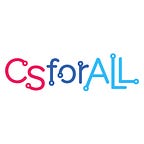Big Computer Science Education Happenings In A Small District
CSforALL’s member, BootUp PD, has partnered with a district (Caroline County Public Schools) that serves only 5,000 students to support the broadening of Computer Science Education.
Computer science education has increasingly become a priority for school districts all over the country in the last few decades. For many years, states, districts, and organizations have been using the K-12 Computer Science Framework to develop and implement programs for secondary students to explore computing concepts. However, until recently, much of the focus has remained at the secondary level because of concerns about elementary students’ readiness to tackle demanding topics such as computing systems, algorithms, and the impacts of computing. In addition, there were the ever-present constraints of time, funding, and teacher training.
In September of 2018, the Maryland State Department of Education adopted their K-12 Computer Science (CS) standards. Caroline County Public Schools was ahead of the game at the secondary level with computing courses already being offered as early as sixth grade, but wondered what these standards look like in practice at the elementary level. Who would teach them? When would there be time? Most importantly, would elementary students be ready?
With these tough questions in mind, the district instructional technology department purchased a few coding robots such as Bee-Bots, Spheros, and Dashes. These robots allowed teachers from various content areas to begin incorporating computing concepts into their current curriculum in a fun but meaningful way. For example, Kindergarten students could work in teams to code Bee-Bots to move from one of their current sight words to another on a floor map or dip Spheros in paint to code their own painting a la Jackson Pollock. These first hands-on coding experiences were the perfect introduction but a long-term, equitable, and meaningful elementary CS implementation plan was needed to move forward.
In the fall of 2019, Caroline County Public Schools partnered with BootUp PD to create a personalized plan to implement the Maryland CS standards. After several meetings, a year-long plan was created that involved the Media Specialists at all five Caroline County elementary schools, the district Instructional Technology Coach, and a BootUp training specialist specifically assigned to Caroline. This plan also included whole group and individualized training for Caroline staff using MIT’s Scratch and ScratchJr programs. Caroline County was drawn to using the Scratch platforms because they did not require students to look for the ‘solution’ to a coding problem. Instead, the Media Specialists were taught how to use the MIT platforms, along with strategies on ‘chunking’ the learning for elementary students. They were also taught how to encourage students to think beyond the given prompt and code their own creations.
Federalsburg Elementary School Media Specialist Brittainy Simmons said, “BootUp has empowered me with the ability to teach coding skills to all students of all abilities. The instructor broke down the coding process in an easily understandable way that allowed the teachers to build their confidence in teaching coding to students. Our students are excited about coding in media class, and feel confident enough with coding to try new things and experiment. My confidence with coding has positively affected the students’ confidence. This wouldn’t have happened without the training by BootUp.”
Moving into the 2020–2021 school year, Caroline County Public Schools, like many other school districts, began with most students learning virtually; however, the work continued with BootUpPD. Brenda Bass, the BootUp facilitator assigned to Caroline County, offered to move her workshops to a virtual platform. This allowed Media Specialists the opportunity to spend more time really diving into the Scratch platforms, which might not have been possible otherwise.
Look at the 2021–2022 school year, the Caroline County and BootUp partnership will continue with (hopefully) co-teaching and planning opportunities between Brenda (the facilitator) and each of the Caroline County elementary Media Specialists.
Supervisor of Instruction Amy Shepler said, “What is really exciting is that the Maryland Department of Education recognizes that the implementation of elementary computer science standards is, in large part, being done by Media Specialists. This summer, our Media Specialists will have the opportunity to learn more about how the elementary CS standards are intertwined with the Maryland School Library Media Standards.”
While starting an elementary computer science program may seem intimidating at first, Caroline County Public Schools found that flexibility, determination, and resourcefulness are the keys to success. Before purchasing the first coding robot, Caroline County pulled all stakeholders together to examine the elementary computing priorities to ensure a vertically-aligned, equitable, and approachable elementary computer science implementation plan.
“We are so thankful for our partnership with BootUp PD,” Amy Shepler said, “and all of the time they have spent helping our staff feel not only prepared but excited to share their computer science knowledge with our youngest learners.”
About the Author: Caroline County Public Schools serves over 5,800 students in pre-kindergarten through 12th grade. In partnership with families and community, they prepare all students to achieve college, career, and life readiness through a challenging and progressive educational experience.
